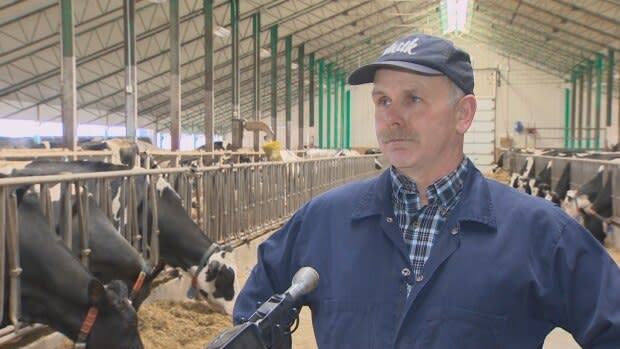N.S. dairy farmers resort to dumping milk amid COVID-19
Some dairy farmers in Nova Scotia have resorted to dumping milk outside their barns as a way to adjust to a recent three per cent cut in quota.
"Nobody likes to do that," says Shubenacadie dairy farmer Gerrit Damsteegt. "It's no fun."
The Dairy Farmers of Nova Scotia began the cut April 1 as a way to adjust to the economic downturn brought on by the COVID-19 pandemic.
Damsteegt, the chairman of the board for the Dairy Farmers of Nova Scotia, said dumping milk is a last resort. They looked at every other available market, including donating to Feed Nova Scotia.
Damsteegt is one of 200 dairy farmers in Nova Scotia.
His herd of 140 cattle is slightly above the average size dairy farm in the province. It produces up to 4,500 litres per day, all of which is purchased by the dairy farmers group and then sold to processors.

Damsteegt said he hasn't had to dump milk yet, but believes his time is coming soon. "That kind of rotates," he said "It's really sharing the loss."
Spike, then decline
Producers enjoyed a sudden spike in demand in early March when consumers rushed to grocery stores to buy as much as they could.
But it levelled off, then declined. Damsteegt believes the actual demand for milk today in Nova Scotia isn't reflected in the number of bags and jugs available in grocery stores.
"There is certainly a discrepancy between how much is being sold in the store and really the demands of the consumers," he said.
In other words, if there are empty shelves where the milk should be it doesn't mean there is a shortage of milk.

On Tuesday, dairy producers were texting Damsteegt's images of signs in grocery stores reminding shoppers they can only buy four litres of milk per visit. Damsteegt said that's creating a bottleneck that he's trying to eliminate.
He said farmers appreciate the challenges those in the retail side of business face as they try to enforce physical distancing inside their stores, but he said it's hurting producers.
Jim Cormier of the Retail Council of Canada said it is true some stores are putting limits on how much milk consumers can buy.
But he said it's not unlike milk producers themselves applying limits. The market is in uncharted territory and the entire chain is being cautious.
"We just simply ask for patience because … the store manager knows best how to manage his or her store. They understand the supply chains. They understand what the demands are from the customers that frequent that store regularly."
Other retail closures having an impact
Cormier said it's not just grocery stores that are slowing things down for the dairy industry.
"Other customers are schools. Those are now closed. Restaurants. Those are now closed. Coffee shops. Those are now closed. You can go on and on and on," he said.
"So we just want to make sure that folks understand, because this issue has come up in previous weeks and at times it was stated a bit unfairly, that … retailers are responsible for this."
Damsteegt said he's grateful that, in many ways, it's still business as usual on the farm.
"In the morning I still have to get up," he said. "I still have to go and milk the cows. I still have to feed them. I still got to do my daily chores. And yes, this has been hard on a lot of people
"This will affect the economy overall but we'll get through it. We will see the light at the end of the tunnel."
MORE TOP STORIES

 Yahoo Sports
Yahoo Sports 